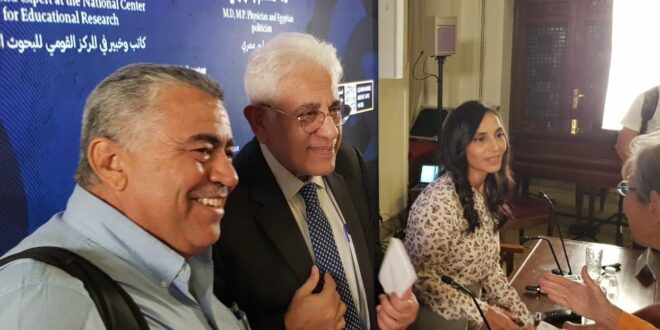“Philosophy of Education”
Hossam Badrawi
in AUC
Under the title “The Philosophy of Education ,” Dr. Hossam Badrawi gave an interesting lecture & participated in a discussion panel on September 30, 2024, held at the Oriental Hall of the American University, at the invitation of the Center for Alternative Political Solutions.
The panel focused on the philosophy of education and its primary purpose: building human beings or preparing them for the labor market. The session was moderated by Dr. Soheir Abdel Aaty, head of the Center for Alternative Political Solutions, and also featured Dr. Badrawi as the main speaker & Dr. Kamal Moghith, an educational expert from the National Center for Educational Research as co speaker .
Dr. Badrawi began by reviewing the evolution of the philosophy of education over the ages, starting with Plato and the idealist philosophy, which aims to develop intellectual and moral qualities. In this philosophy, the teacher serves as a role model, guide, and motivator for discovering truths and promoting critical thinking.
He then moved on to the “Realist” philosophy of Aristotle, which believes that the material world is the true reality, discoverable only through sensory experiences. In this context, the student learns objective truths, and the teacher’s role is to transmit material knowledge through observation, classification, and scientific analysis.
He also discussed Pragmatism Philosophy championed by John Dewey, which is sometimes called the philosophy of action. In Pragmatism, facts and knowledge are dynamic and constantly evolving. The teacher’s role is to facilitate skill development, critical thinking, and problem-solving, rather than merely transmitting knowledge. Existentialism philosophy , represented by figures like Jean-Paul Sartre, aims to build character, define life’s meaning, and foster creativity and independence. In existentialism, the teacher creates an environment where students can make their own decisions, explore their interests, and embrace self-reflection and creativity.
Dr. Badrawi noted that presenting these philosophies was crucial for understanding the nature and goals of education and how it must evolve in line with progress; otherwise, it risks losing its essence. He explained how the role of the teacher has changed and continues to change with the development of these philosophies, emphasising the necessity for the teacher’s role to evolve in light of modern developments.
He added that these philosophies still form the foundational theoretical framework of modern education but have been adapted to suit contemporary education, which is characterized by globalization, technological advancement, and increasing social and cultural diversity. Idealism now seeks to develop critical thinking and moral understanding through curricula that engage students with major issues and deep ideas in philosophy and the humanities. Realism has become more interactive in the fields of science, technology, engineering, mathematics, and logical thinking. Pragmatism has gained importance through project-based and experiential learning, while existentialism promotes student autonomy, decision-making, and the ability to chart their educational paths.
Dr. Badrawi also mentioned the emergence of new educational philosophies, such as Constructivism, which encourages students to build their own knowledge rather than passively receive it from teachers, and critical Pedagogy, which aims to make students agents of social change by analyzing social, political, and economic systems. Teachers in this philosophy inspire critical thinking on issues affecting human rights and society. Technological philosophy, which relies on digital platforms and virtual reality, has reshaped the student-teacher relationship, based on new realities that did not exist before. Finally, the philosophy of globalization has made the world a single place where cultures meet, fostering global values that promote understanding, tolerance, and cultural diversity.
Dr. Badrawi then presented examples of the modern challenges facing educational philosophy, such as the value of schools and teachers at a time when all information is readily available to everyone, and how educational philosophy has evolved to support the concept of lifelong learning.
He then transitioned to the philosophy of higher education, discussing the university’s role in offering the unexpected to societies, driving innovation, and fighting for change. Universities need to proliferate, spread, and evolve.
Dr. Badrawi summarized the university’s functions as contributing to societal well-being by preparing students for the future, equipping them with skills for progress, and enhancing their research and innovation capabilities.
Universities explore knowledge, perspectives, and meanings and question assumptions.
He stated that universities are built on two pillars: one that shifts from focusing on immediate existence (well-being needs) to the new reality (the pursuit of truth) and the other that moves from opposition (the critical side) to agreement (commitment to contributing to social productivity).
Dr. Badrawi stressed the need for academic freedom for universities to play their role in cultural advancement and modernization, as well as institutional independence, enabling them to set their own vision, determine their obligations, and make the best use of their resources without neglecting accountability.
Dr. Badrawi concluded his speech with a quote from Dr. Taha Hussein:
“The university does not just produce scholars; it creates cultured, civilized individuals. It is not enough for them to be cultured; they must also be sources of culture. Nor is it enough for them to be civilized; they must also contribute to civilization.
If the university falls short in achieving one of these two qualities, it is unworthy of being called a university. It becomes just another modest school among many, failing to be a beacon of light for the country it serves and the humanity it strives for. Instead, it becomes a mere factory, producing a group of workers with limited hopes and limited capacity for good and reform.”
Dr Badrawi’s paintings that accompanied his slide presentation amazed attendees , as he finished saying gaining knowledge & new skills should be a life time request for all of us to live happily and serve ourselves, families & society.
 Dr. Hossam Badrawi Official Website
Dr. Hossam Badrawi Official Website


